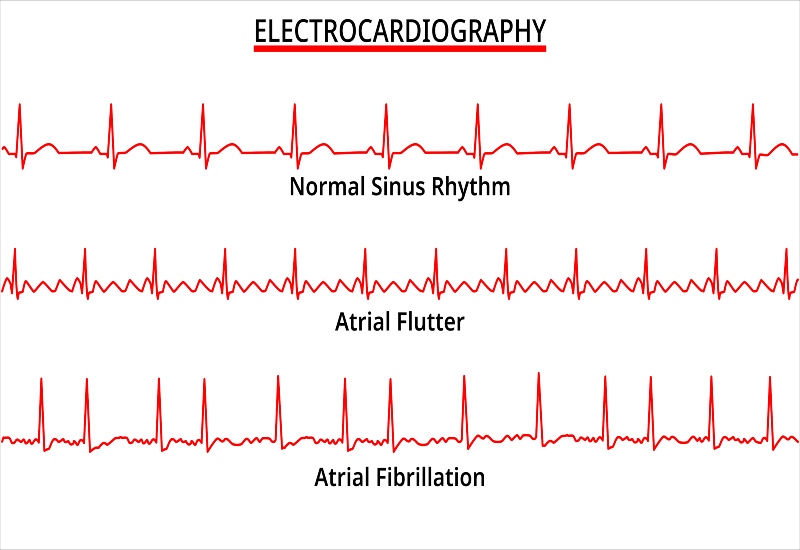Atrial Flutter vs Atrial Fibrillation: Understanding the Key Differences and Similarities

Atrial Flutter vs. Atrial Fibrillation: Understanding the Key Differences and Similarities
Your heart beats every second of your life, delivering oxygen and nutrients to your body. This process allows you to live, move, and be active. However, irregular heart rhythms can disrupt this critical function for some people. As a result, heart rhythm management is essential. If you’re in New Hampshire, Cardiovascular Specialists of New England can be your trusted heart health resource. Two common cardiac arrhythmia types are atrial flutter and atrial fibrillation, commonly known as Afib. Although they share similarities, they have distinct conditions with unique characteristics.
This guide will explain the notable Afib and atrial flutter differences and similarities to help you better understand these heart rhythm disorders. We’ll also highlight how to recognize their symptoms, treatment options, and ways to manage heart rhythm issues.
What Is an Atrial Flutter?
Atrial flutter is a type of arrhythmia where the electrical signals in the heart’s upper chambers create a fast but organized rhythm. Imagine a rapid, circular motion of electrical activity in the heart. Instead of the typical steady beat, an atrial flutter generates a faster and more consistent rhythm.
The rapid rhythm prevents the atria from fully contracting and squeezing out enough blood. This disruption can ultimately affect the blood flow to the rest of the body, leading to symptoms like fatigue and dizziness. Atrial flutter is less common than atrial fibrillation and may present as a temporary issue or recurring problem. Its triggers often include:
- Heart disease or heart surgery
- High blood pressure
- Chronic lung conditions
- Excess alcohol consumption or binge drinking
Atrial Fibrillation and Its Effects
Atrial fibrillation is another cardiac arrhythmia type caused by chaotic electrical signals in the atria. Unlike the organized rhythm seen in atrial flutter, Afib is irregular and disorganized, causing the atria to quiver. This erratic rhythm can lead to ineffective blood pumping and create blood clots in the heart, increasing the risk of stroke. Afib is more prevalent and typically longer-lasting than atrial flutter, meaning it needs dedicated management. Among Afib’s triggers and risk factors are:
- Age (more common in older adults)
- High blood pressure
- Congenital heart defects
- Diabetes
- Excessive stress or stimulants like caffeine or tobacco
Recognizing the Symptoms of Atrial Flutter and Atrial Fibrillation
Both atrial flutter and atrial fibrillation share similar symptoms, making it challenging to tell them apart without proper medical testing. Furthermore, some individuals may not experience symptoms initially, so regular check-ups are vital if you’re at risk for heart rhythm disorders. For those with symptoms, common signs include:
- Rapid or irregular heartbeat
- Heart palpitations
- Dizziness or lightheadedness
- Fatigue or feeling unusually tired
- Shortness of breath, especially during activity
- Chest discomfort or pain
Afib and Atrial Flutter Differences
While these cardiac arrhythmia types have many similarities, a complete heart rhythm disorders comparison also includes their differences. Here’s what separates the pair:
Rhythm Pattern
- Atrial Flutter – Creates a rapid but organized electrical pattern in the atria
- Atrial Fibrillation – Causes a chaotic, irregular rhythm in the atria
Prevalence
- Atrial Flutter – Less common
- Atrial Fibrillation – More widespread
Risk Factors
Both conditions share risk factors such as high blood pressure and heart disease, but Afib is often associated with age-related heart changes or more severe underlying conditions.
Health Risks
Both arrhythmias can lead to complications like stroke or heart failure. Afib, however, has a higher stroke risk due to its higher likelihood of causing blood clots.
Diagnosis
Specialized testing, like an electrocardiogram (ECG), is needed to distinguish between the two arrhythmia types. An ECG for atrial flutter shows a more predictable rhythm, while an Afib recording appears irregular.
Heart Rhythm Management and Treatments
Both atrial flutter and Afib benefit from similar heart rhythm management and treatments. The goal is to restore a regular heart rhythm, reduce symptoms, and minimize health risks. Cardiovascular Specialists of New England can do this through:
Medication
- Blood-thinning medications help reduce the risk of stroke.
- Anti-arrhythmic drugs can help control heart rate and rhythm.
Cardioversion
This procedure involves using electrical impulses or medications to reset the heart’s rhythm.
Catheter Ablation
This minimally invasive procedure targets the problematic heart tissues causing an irregular rhythm. Ablation is often a successful treatment for both atrial flutter and atrial fibrillation, providing long-term symptom relief.
Lifestyle Modifications
- Reducing alcohol or caffeine consumption
- Following a heart-healthy diet
- Regular exercise routines
- Effective stress management
Trust Cardiovascular Specialists of New England
When managing heart rhythm disorders like atrial flutter or Afib, you deserve the help of experienced experts like you’ll find at Cardiovascular Specialists of New England. We’re dedicated to helping our patients throughout New Hampshire regain their quality of life. Our state-of-the-art clinics in Londonderry and Manchester have the latest technologies, which we use to create comprehensive care plans. Let us help you achieve the best possible outcomes for your health.
Contact Us to Take Charge of Your Heart Health
If you’re experiencing any atrial flutter or atrial fibrillation symptoms, don’t wait to seek professional advice. Early diagnosis can significantly improve your prognosis and reduce potential complications through effective heart rhythm management. Cardiovascular Specialists of New England believes that your heart deserves the best, so contact us today to schedule a consultation.
Stay Tuned! More information coming soon!
